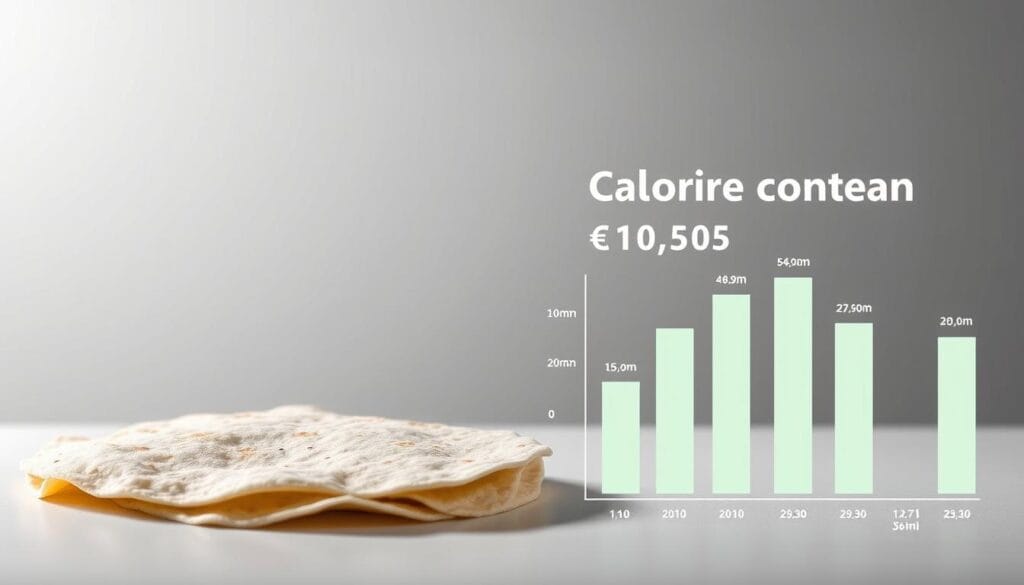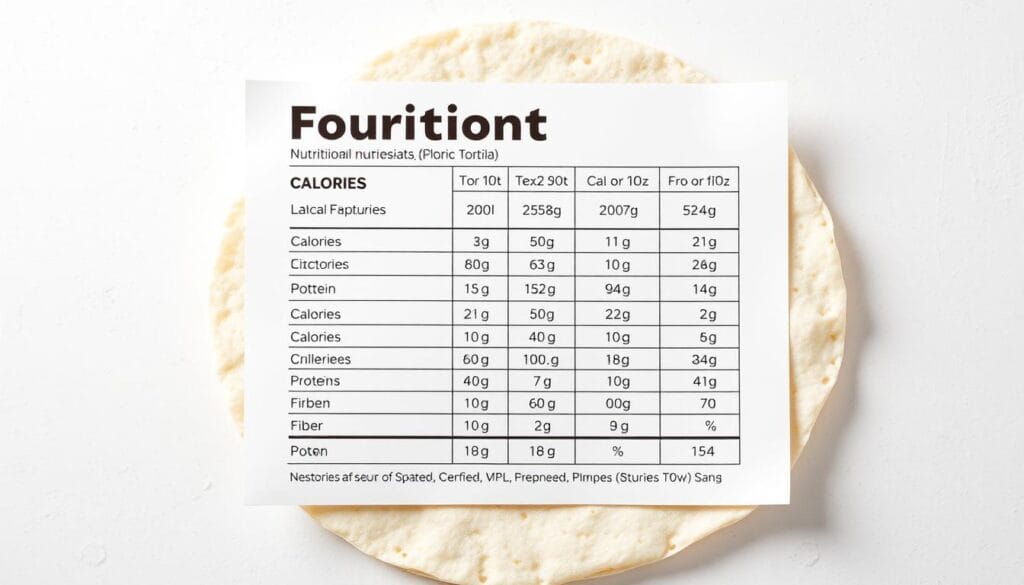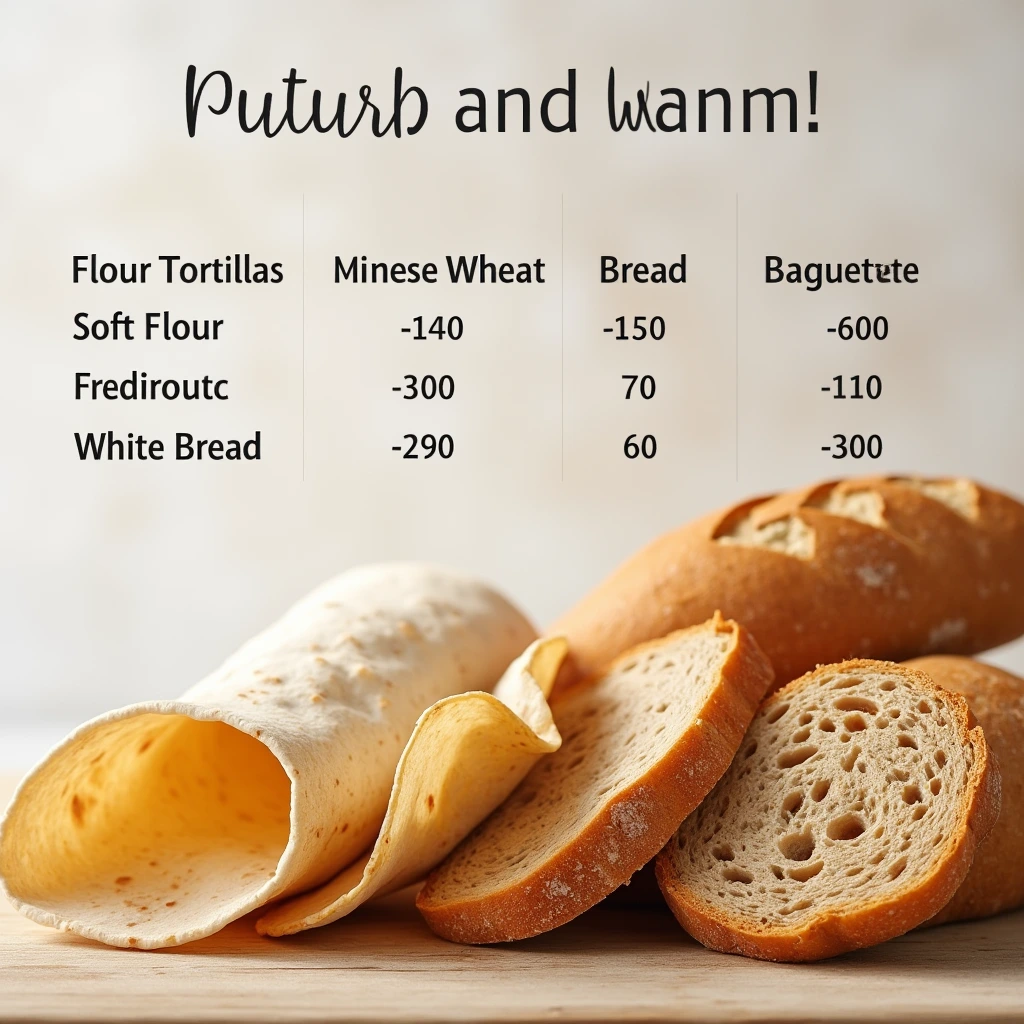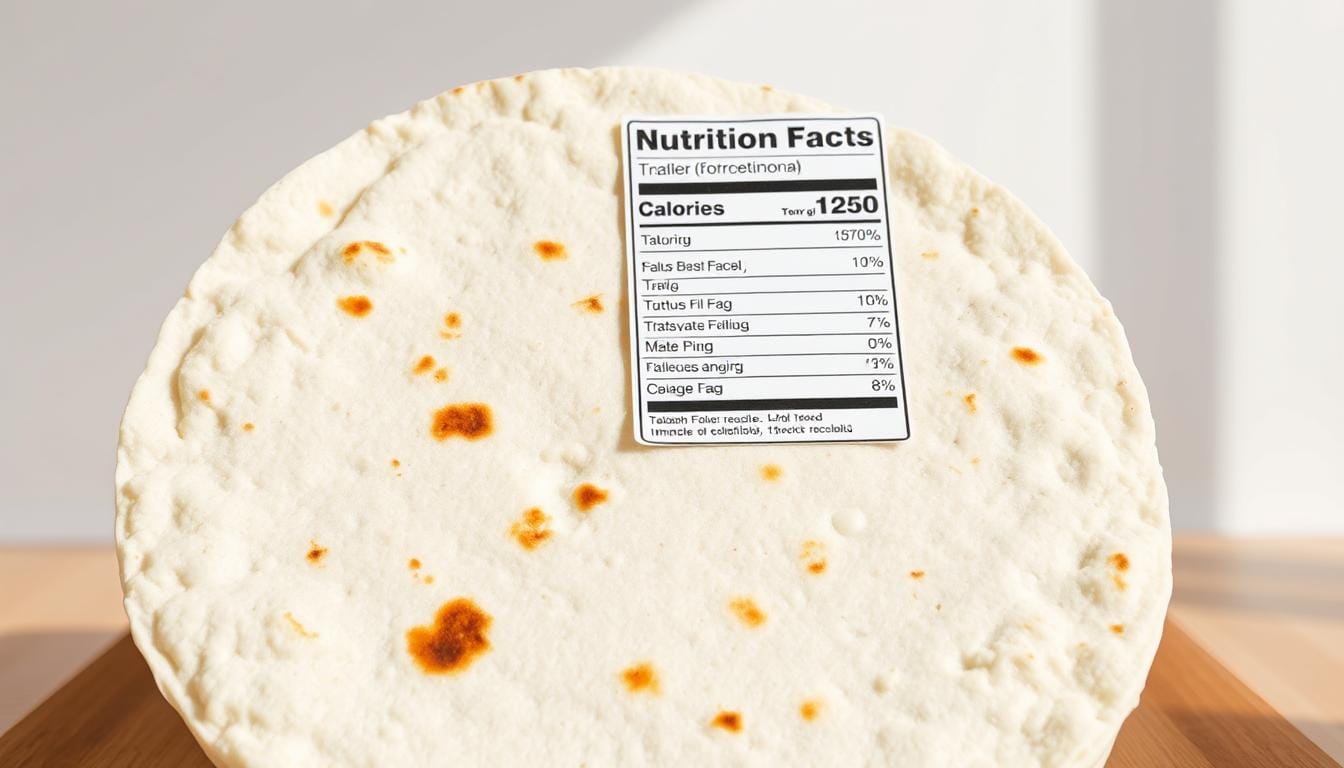Table of Contents
Imagine you’re looking at your lunch options, wanting that perfect wrap or taco. But then you wonder, “What’s really in this tortilla?” Tortillas are a staple for many, offering comfort and versatility. Yet, understanding their calorie count can be tricky.
Whether you’re trying to lose weight, manage carbs, or just eat better, knowing the calories in tortilla and tortilla nutrition facts is key. It helps you make choices that fit your health goals.
Key Takeaways
- A 6-inch flour tortilla has about 110–130 calories, while a 10-inch can hit 200+ calories.
- Size and ingredients like oil or added fats significantly shift calorie counts.
- Whole wheat tortillas often have more fiber but similar calorie ranges to white flour options.
- Commercial brands vary widely—some add sugar or preservatives that boost calories.
- Portion control and ingredient choices make tortillas fit into both low-carb and heart-healthy diets.
Understanding the Basic Nutritional Profile of Flour Tortillas
Flour tortillas are a common food, but they offer more than just calories. This section looks at how ingredients and cooking methods affect their health benefits. We’ll see what each tortilla really adds to your diet.
Macronutrient Composition of Standard Flour Tortillas
Most flour tortillas get their energy from three main sources:
- Carbohydrates: About 20–25g per medium (8-inch) tortilla, mostly from wheat flour.
- Protein: 3–5g, helping muscles without being a big source.
- Fats: 2–5g, based on added oils like canola or vegetable oil.
How Size Affects Nutritional Content
Size changes tortilla nutrition facts. Here’s a comparison:
| Size | Calories | Carbohydrates (g) |
|---|---|---|
| 6-inch | 80–100 | 15–18 |
| 8-inch | 120–140 | 20–22 |
| 10-inch | 160–190 | 25–28 |
Bigger sizes mean more calories. So, pick the right size for your needs.
Key Vitamins and Minerals in Flour Tortillas
Fortified tortillas add important nutrients. You’ll often find:
- Iron: 10–15% of daily needs in one serving.
- B Vitamins (B1, B2, B3): Help with energy and nerve function.
- Calcium: Some brands add 50–100mg per tortilla for bones.
Looking at tortilla nutrition facts labels helps find the best choices for more nutrients.
Calories in Tortilla: Exact Numbers You Need to Know
When looking into calories in tortilla, it’s important to find consistent information. A standard 6-inch flour tortilla usually has 100-120 calories. If you go for an 8-inch tortilla, you’ll find 150-180 calories. The tortilla calorie count can change based on the brand and what’s inside.
For example, Mission Soft & Flaky Flour Tortillas have 70 calories per 6-inch serving. La Tortilla Factory’s 8-inch Original Flour Tortillas have 100 calories.

- Small (6-inch): 70-120 calories
- Medium (8-inch): 100-150 calories
- Larger (12-inch): 200-250 calories
Adding oil or lard to recipes increases the tortilla calorie count. Choosing whole wheat tortillas might add more fiber but not calories. Always check the labels for your favorite brands. Some may include sugars or preservatives that change the calorie count.
These numbers are for plain tortillas. Adding cheese or sauces will increase the calories. For accurate tracking, use the information from the packaging. Knowing these basics helps you plan meals that meet your daily calorie needs.
Comparing Store-Bought vs. Homemade Flour Tortilla Calories
Choosing between store-bought and homemade flour tortillas impacts your tortilla calorie count. Commercial brands vary a lot. Knowing these differences helps you make better choices. Let’s look at the main points.
Average Calorie Content in Commercial Brands
Big brands like Mission and Tia Maria’s show calories in tortilla per serving on their packaging. For instance:
- Mission 8-inch flour tortilla: 120 calories
- La Tortilla Factory: 110–130 calories depending on size
- Store-bought tortillas often have preservatives and oils, which add a few calories
Traditional Homemade Recipe Calorie Analysis
Making tortillas at home lets you control everything. A simple recipe with 1/3 cup flour, water, and a bit of fat can have tortilla calorie count as low as 80 calories per small tortilla. Important factors include:
- Flour type: All-purpose vs. whole wheat changes fiber and calories
- Fats like lard or oil add 10–30 calories per tortilla
- Homemade tortillas have no preservatives, so there are fewer hidden calories
Impact of Preparation Methods on Calorie Count
Cooking methods are crucial. Griddles use little to no oil, keeping calories low. Frying in oil adds 20–50 calories per tortilla. Here are some tips:
- Use non-stick surfaces to avoid extra fats
- Measure ingredients carefully to track calories in tortilla
Small changes in how you prepare can help keep your tortilla calorie count in line with your goals.
How Tortilla Size Influences Calorie Content
Choosing the right tortilla size can help you manage your calorie intake. Smaller options pack fewer calories, while larger ones add more energy to your meal. Let’s break down how calories in different types of tortillas vary based on their size.
Small (6-inch) Tortillas
At just 6 inches wide—about the size of a DVD—these tortillas average 80–120 calories. Ideal for snacks or taco shells, they’re a smart choice when portion control matters. Opt for these to keep calories in tortilla low without sacrificing flavor.
Medium (8-inch) Tortillas
Most grocery stores stock 8-inch tortillas, which deliver 150–200 calories. Perfect for wraps or handheld meals, they balance taste and moderation. Their moderate size works well for lunch options like veggie-stuffed wraps.
Large (10–12 inch) Tortillas
Burrito-sized tortillas span 10–12 inches and pack 250–350 calories. These are best for hearty meals like breakfast burritos or stuffed dinners. Use them mindfully to avoid overeating.
Picking the right size lets you tailor meals to your goals. Always check labels for exact numbers, as ingredients like oil or additives can shift calorie counts. Whether you’re building a snack or a feast, sizing matters!
Nutritional Differences Between White and Whole Wheat Flour Tortillas
Thinking about white or whole wheat flour tortillas? The nutritional information tortilla changes a lot depending on the grain. White flour tortillas are made from refined grains, losing the bran and germ. On the other hand, whole wheat keeps these parts for more fiber and nutrients.
- Fiber: Whole wheat has 3-4g per tortilla, while white has 0.5-1g.
- Fats: Both types use similar oils, so calorie counts are similar (100-130 calories each for 6-inch sizes).
- Vitamins: Whole wheat has more B vitamins and iron because it keeps the germ.
Some say calories in different types of tortillas are almost the same. But, whole wheat might have less calories because it can have sugars or oils to taste better. Brands like Mission Whole Wheat and La Tortilla Factory show these differences on their labels. Choosing whole wheat can increase fiber, but always check the ingredients.
Want to try both? Start by mixing them in your meals. Whole wheat is great in tacos but might get dry when reheated. Look for brands that say “100% whole wheat” and don’t add sugars. Your choice affects not just calories but also your energy and digestion over time.
Tortilla Nutrition Facts: Beyond Just Calories
Looking at tortilla nutrition facts means more than just calories. The nutritional information tortilla labels show carbs, fats, protein, and sodium. These details help you pick the right tortillas for your health goals.

Carbohydrate Content and Glycemic Impact
Most flour tortillas have 15–30g of carbs per serving, mostly from refined wheat. Look at nutritional information tortilla labels for fiber. More fiber means less glycemic impact. Choose whole wheat tortillas to keep blood sugar stable:
- White tortillas have a higher glycemic index (GI ~70).
- Whole grain options have a lower GI to ~50, slowing sugar absorption.
Fat Profile in Standard Flour Tortillas
Average tortillas have 2–5g of fat, mainly from oils like canola. Tortilla nutrition facts show most have 1–2g saturated fat. Choose brands with unsaturated fats for heart health:
- Unsaturated fats: 1.5–3g per serving.
- Saturated fats: Keep under 1g per serving for better heart health.
Protein Value in Your Daily Diet
Most tortillas have 2–4g protein, helping with muscle repair. This amount is small but adds up with beans or eggs. Vegetarians can use tortillas as a small protein boost in meals like tacos or wraps.
Sodium Levels to Consider
Commercial brands vary a lot—some have 100–200mg sodium per tortilla. Compare labels: La Tortilla Factory’s whole wheat has 150mg, while Mission’s white flour has 250mg. Choose low-sodium options if you’re watching your salt intake.
Low-Calorie Tortilla Alternatives for Health-Conscious Consumers
Looking to cut tortilla calorie count without losing flavor? Try these smart swaps. Mission Carb has 30-calorie options with 3g fiber. La Tortilla Factory’s whole-grain tortillas are 20% lower in calories than regular ones. Here are some great alternatives:
| Type | Calories (per tortilla) | Fiber (g) | Protein (g) |
|---|---|---|---|
| Lettuce wraps | 5-10 | 0.5 | 0.5 |
| Corn tortillas | 52-65 | 1-2 | 1.5 |
| Cauliflower-based | 20-30 | 2-4 | 1-2 |
| Whole-wheat | 70-80 | 3-4 | 3 |
- Choose corn tortillas to save 15-25 calories per serving
- Go for cauliflower wraps for gluten-free options under 30 calories
- Look for high-fiber options adding 2-4g fiber
Watch out for sodium in pre-packaged tortillas—some have over 100mg. Always compare calories in different types of tortillas when you shop. Try almond flour or chickpea-based wraps for similar textures. Choose brands that are open about their ingredients to meet your taste and nutrition needs.
How Tortillas Compare to Other Bread Products Calorically
Choosing the right bread for your meal starts with knowing the calories in tortilla compared to alternatives. Here’s how tortillas measure up against common bread types:

Tortillas vs. Sandwich Bread
A standard 8-inch flour tortilla has roughly 120–150 calories. Two slices of white or whole wheat bread (about 80g) average 120–140 calories. While numbers are similar, tortillas’ flexible shape lets you control fillings for balanced nutritional information tortilla portions.
- Wrap: 1 tortilla = 1 slice of bread (calorie-wise)
- Sandwich bread offers fiber in whole grain options, but tortillas win for lighter layering
Tortillas vs. Pita Bread
Pitas, at 140–180 calories for an 8-inch round, often edge higher due to thicker dough. The pocket design can trap more toppings, impacting total meal calories. Opt for whole wheat pitas to boost fiber without adding extra calories in tortilla equivalents.
Tortillas vs. Naan and Other Flatbreads
Naan breads typically pack 200–250 calories because of added oils and leavening. In contrast, flour tortillas stay lower-calorie. Lavash and chapati fall midway, around 100–130 calories. Always check nutritional information tortilla variations like whole grain or stuffed versions.
When building meals, account for spreads, cheeses, or fats added to breads. A plain tortilla’s lean profile makes it a smart swap for higher-calorie options like naan. Adjust portions based on your dietary goals.
Incorporating Flour Tortillas into a Balanced Diet
Knowing tortilla nutrition facts is key to making good choices. Look at nutritional information tortilla labels for carbs, fiber, and protein. For instance, Mission Whole Wheat Tortillas have 120 calories and 3g of fiber. They are a better choice than refined ones.
- Portion Control: Use 6-inch tortillas (100-120 calories) for snacks or light meals.
- Pair with Protein: Add grilled chicken or black beans to boost satiety. Try a wrap with hummus, spinach, and turkey breast.
- Low-Carb Options: Opt for La Tortilla Factory’s Reduced Carb Tortillas (40 calories each) when cutting carbs.
- Meal Timing: Enjoy tortilla-based meals like veggie tacos earlier in the day to align with activity levels.
Pair tortillas with veggies: fill a tortilla with roasted peppers, avocado, and feta for a nutrient-rich lunch. Always compare brands—some add unhealthy fats. Choose whole grain versions to increase fiber. By balancing portions and ingredients, tortillas can fit into any diet, from keto to vegan.
Common Tortilla-Based Meals and Their Caloric Impact
When making meals with tortillas, the calories in different types of tortillas are crucial. A standard 8-inch flour tortilla has about 140 calories. But, adding meats, cheeses, and sauces can quickly increase the calorie count. Let’s look at some popular dishes:
- Burritos: A typical 10-inch flour tortilla (200 calories) with beans, rice, and salsa can have 400–600 calories. Choosing whole wheat tortillas can reduce calories by 20%.
- Tacos: Two 6-inch corn tortillas (total 100 calories) with grilled chicken and veggies can have 300–400 calories. Soft corn tortillas are better than flour to save 30–50 calories per taco.
- Quesadillas: Cheese-filled flour tortillas can have 400–600 calories. Replacing half the cheese with sautéed peppers can cut calories by 15%.
Restaurant meals often have more calories because of oil, heavy toppings, or large portions. Cooking at home lets you control what goes into your meals. Try these changes:
- Use lettuce wraps instead of tortillas for wraps (cuts 100+ calories).
- Add salsa or fresh herbs instead of sour cream (saves 50–100 calories).
Controlling portion sizes is also important. A 6-inch tortilla is good for one person, while larger sizes (10-inch+) can serve two. Keeping track of the tortilla calorie count helps balance meals without losing flavor.
Conclusion: Making Informed Choices About Tortillas in Your Diet
Knowing the calories in tortilla and tortilla nutrition facts helps you make better choices. Whether you buy them or make them yourself, look at the whole nutritional picture. Whole wheat tortillas, for example, have more fiber and nutrients than refined flour ones. They help keep you full and support good digestion.
Choosing the right size of tortilla is also important. A 6-inch tortilla has fewer calories than a 12-inch one. So, picking the right size helps keep your meals balanced. Adding vegetables, lean proteins, or beans to tortillas makes them even healthier. Baking or air-frying them instead of frying also cuts down on extra fats.
Tortilla nutrition facts show they’re more than just calories. They’re a base for making healthy, tasty meals. For those watching their weight, keep an eye on portion sizes and choose nutrient-rich fillings. Athletes can use them for quick energy before workouts. And for those with dietary needs, look for gluten-free or low-sodium options.
By choosing quality ingredients and being mindful of portions, tortillas can be a great part of a healthy diet. They’re perfect for tacos, wraps, or snacks, fitting into many different lifestyles. Remember, calories in tortilla are important, but don’t forget their role in making delicious, nutritious meals.
FAQ
How many calories are in a standard flour tortilla?
A standard flour tortilla, about 8 inches, has 140-200 calories. This depends on the brand and ingredients.
What nutritional information should I know about flour tortillas?
Flour tortillas have carbs, protein, and fat. They also have iron and B vitamins. Knowing this helps you eat well.
Do different types of tortillas have different calorie counts?
Yes, tortillas like corn, whole wheat, and flour have different calories. Corn tortillas, for example, have 50-100 calories each.
How does tortilla size impact calorie content?
The size of a tortilla affects its calories. Smaller ones (6 inches) have about 100 calories. Larger ones (10-12 inches) can have 300 calories or more.
Are homemade tortillas healthier than store-bought ones?
Homemade tortillas can be healthier because you choose the ingredients. But, their calories depend on what you use and how you make them.
What options do I have for low-calorie tortillas?
For fewer calories, try low-carb, high-fiber, or protein-rich tortillas. These options have less fat and calories but still offer nutrition.
How do tortillas compare to other types of bread in terms of calories?
Tortillas might have fewer calories than sandwich bread. But, it really depends on the product. For example, a slice of bread has 80-100 calories, while tortillas vary.
Can I eat tortillas on a low-carb diet?
Yes, you can eat tortillas on a low-carb diet. Choose low-carb tortillas to fit your diet and still enjoy your favorite dishes.
What are some common tortilla-based meals and their caloric impact?
Meals like burritos, quesadillas, and tacos can have lots of calories. They can have over 500 calories, depending on what’s inside. Be careful of the ingredients and portion sizes.
How does sodium content in tortillas affect my diet?
Sodium in tortillas varies by brand. Some have a lot of sodium. This is something to think about, if you’re watching your sodium intake.

